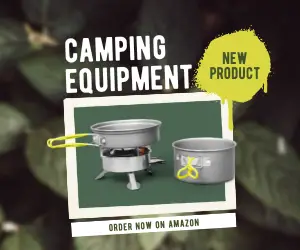[ad_1]
During peak summer season in Yosemite National Park, when campgrounds are packed, the spent gas canisters that people use to fuel their camping stoves and lanterns tend to pile up on the ground near dumpsters as if no one is quite sure what to do with them.
Despite there being special recycling bins for empty propane canisters, the stray canisters — 1-pound, forest-green cylinders sold by brands like Coleman and Bernzomatic — present a constant chore for rangers.
“We’ll have hundreds if not thousands of them in the park,” said Yosemite spokesman Scott Gediman.
To cut down on the pile-ups and reduce overall waste, Yosemite pulled single-use canisters from shelves in park stores two years ago. Now, the park sells only refillable tanks and runs an exchange program — similar to the arrangement by which people trade in their backyard barbecue propane tanks at local hardware stores for discounted fresh ones.
That type of system could soon become the norm for campers everywhere in California.
A first-in-the-nation bill headed to Gov. Gavin Newsom’s desk this week would ban the sale of disposable, 1-pound propane cylinders in California by 2028. The state Assembly and Senate both approved the legislation, SB 1256, last week, and advocates are hopeful Newsom will sign it into law before the legislative session ends Aug. 31.

Justin Rodriguez lights a propane grill in Camp 4 in Yosemite National Park.
Tracy Barbutes/Special to The Chronicle“These 1-pound propane cylinders are often among the litter found in our parks and beaches, highly expensive for local governments to properly handle and dangerous for workers in our hazardous waste programs,” state Sen. Bob Wieckowski, D-Fremont, who introduced the bill, said in a statement.
Between 4.5 million and 7 million of the non-refillable propane cylinders are sold in California each year, according to an estimate from the California Product Stewardship Council, the nonprofit local government coalition that is sponsoring SB 1256. The council reckons that only about a quarter of them are recycled through the state’s household hazardous waste program, the system designed to divert batteries, televisions, chemicals and other problematic items from landfills.
That may mean that millions of pounds of camping-stove canisters are piling up in garbage dumps each year, according to Doug Kobold, the council’s executive director.
“These should have never come on the marketplace because of the sheer waste,” he said.
California lawmakers have embarked on all kinds of “zero waste” initiatives to dissuade people from buying throwaway items. If SB 1256 becomes law, it would trigger a five-year period for retailers and manufacturers to phase out single-use cylinders, beginning in January 2023.
The ban would not affect the isobutane canisters favored by backpackers or butane spray cans often used with single-burner stoves. It would also exempt “tall boy” propane canisters used by plumbers and tradespeople and allow government agencies to dole out single-use propane cylinders in emergencies.

Two years ago, Yosemite stopped selling single-use propane canisters and began exclusively selling refillable ones from Manteca company Little Kamper.
Tracy Barbutes/Special to The ChronicleMost of the 1-pound propane canisters sold in the United States, including those from Coleman and Bernzomatic, are produced by Cleveland manufacturer Worthington Industries. In a phone call with The Chronicle, a Worthington spokesperson called SB 1256 “a very narrow bill” that wouldn’t improve the “end-of-life” outcome for camping-stove canisters: Whether refillable or single-use, ultimately they need to be properly recycled the same way, she said.
“Our concern is that it doesn’t solve for the environmental concerns (at the heart) of the bill,” said Worthington vice president of corporate communications Sonya Higginbotham. “We think there is a place for both non-fillable and refillable cylinders.”
A ban on single-use canister sales in California “could be highly disruptive” to campers, Higginbotham said. Worthington might begin making refillable canisters, but they would cost more than their single-use counterparts — “probably about three times more,” she said.
The average 1-pound propane canister from Coleman sells for about $5 online, whereas a refillable cylinder from leading manufacturer Flame King goes for about $15.
“It’s been hard for 1-pounders in the reusable market to take hold because of that unfair price point for single-use,” Kobold said.
The refillables that Yosemite sells come from Manteca company Little Kamper, which runs an exchange program that includes dozens of hardware stores across Northern California. A first cylinder from Little Kamper costs $21.99; a first refill costs $11.99.
The lifespan of refillable 1-pound canisters isn’t exactly clear, Kobold said, in part because they’re relatively new. Reusables on the market are certified for 10 years. Reusables can be filled using a special valve attachment that siphons gas from a 20-pound barbecue propane tank, but it is potentially dangerous to do at home.
“We’re not fans of that because of the hazards,” said Josh Simpson, vice president of marketing for Little Kamper.
In Yosemite, used propane canisters are scooped up by park staffers, counted and categorized by volunteers, then crushed in a special machine the park bought specifically to help dispose of them. Last year, enumerators tallied about 24,000 of them — and that didn’t include any that might have wound up in trash cans, where they don’t belong due to their classification as hazardous waste.

Spent propane canisters waiting for the crusher in Yosemite National Park.
Provided by Josh SimpsonSimpson has volunteered at several canister audits in the park, at times sifting through dozens of garbage bins filled with spent gas canisters. Of the roughly 1,500 cylinders the company sold in Yosemite last year, fewer than 20 turned up in the count, he said.
Judging by what the canister counters in Yosemite have seen, transitioning to refillables might make a meaningful dent in waste volumes.
Yosemite’s shift away from single-use canister sales “has been a huge step in the right direction at the national level,” Kobold said. “We need to get folks to understand the true cost of the single-use cylinders.”
Gregory Thomas is The Chronicle’s editor of lifestyle & outdoors. Email: gthomas@sfchronicle.com Twitter: @GregRThomas
[ad_2]
Source link





